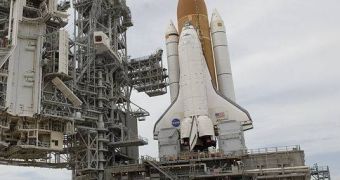The American space agency gave today its final consent for tomorrow's launch of the space shuttle Atlantis on the fifth and last mission to service the venerable Hubble Space Telescope. So, the spacecraft will blast off on Monday, May 11, at 2:01 pm EDT, from Launch Pad 39A at the Kennedy Space Center, in Cape Canaveral, Florida. The mission will last 11 days, during which time five back-to-back spacewalks will be performed by astronauts from the seven-member crew. While Atlantis is in orbit, performing the 126th space shuttle flight, its twin sister craft Endeavor will wait on Launch Pad 39B, ready to launch and assist the Hubble missions, if something is to go wrong.
Making up Atlantis' crew are Commander Scott D. Altman, who will be in charge of the operations, Pilot Gregory C. Johnson, who will have to guide the spacecraft on the treacherous approach to the orbiting telescope, and also Mission Specialists Michael T. Good, K. Megan McArthur, John M. Grunsfeld, Michael J. Massimino, and Andrew J. Feustel.
This is not Altman's first visit to Hubble, as he was a part of the STS-109 servicing mission, which docked on and repaired the observatory as far back as 2002. Grunsfeld also has extensive experience with the telescope, having performed no less than five spacewalks to repair it, during STS-103, in 1999, and STS-109. Massimino was on the latter mission, accompanying his two colleagues, and participated in two spacewalks.
The mission's main objective is to install the Cosmic Origins Spectrograph and the Wide Field Camera 3 instruments, as well as the “Soft-Capture Mechanism,” which will allow the telescope to be approached by an unmanned spacecraft and taken off orbit, when not functioning. In addition, the other spacewalks are set to repair or upgrade a number of other components on the observatory, and will put a new insulating layer and a set of six gyroscopes to Hubble.
While Atlantis will be in orbit, it will carry a larger-than-usual amount of food and other survival equipment. This special concern is caused by the elevated risk of space impact, which was triggered by the February collision between two satellites in the Earth's orbit. If needed, Endeavor will launch the STS-400 mission, which is basically a rescue operation for the astronauts on the first shuttle. The two spacecraft would dock to each other in orbit, and the astronauts in Atlantis would transfer to Endeavor, which would then bring them safely back home.

 14 DAY TRIAL //
14 DAY TRIAL //